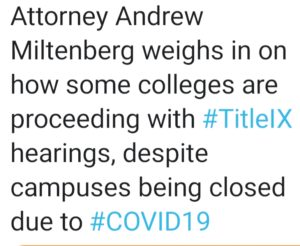TITLE IX: NO MERCY For Accused Students Testing Positive For COVID-19.
 As colleges across the nation send students home and switch to remote classes due to the COVID-19 outbreak, some are moving ahead with even more stressful activities: Title IX proceedings. Andrew Miltenberg said that his firm is representing accused students experiencing such treatment at more than 50 schools.
As colleges across the nation send students home and switch to remote classes due to the COVID-19 outbreak, some are moving ahead with even more stressful activities: Title IX proceedings. Andrew Miltenberg said that his firm is representing accused students experiencing such treatment at more than 50 schools.
Even his clients who have tested positive for the novel coronavirus have been told that their interviews with investigators would be delayed by only a week. Remote interviews with the parties in proceedings raise due process issues. Miltenberg’s email requests that he shared with The Fix sought remote access to pertinent documents and rescheduling of investigators’ interviews until he can be present with clients.
In his request to Purdue, Miltenberg requested “remote digital access” to documents that required a response by March 20, during the extended spring break. “In spite of this nationwide, near-universal call for social distancing, [redacted] was sent a letter today [March 13] indicating that the preliminary investigation report in his disciplinary matter is available for review only in person, only on campus, and only for the next week, during Spring Break,” Miltenberg wrote to the university’s Title IX office. He said these “limitations and requirements are entirely inappropriate and unduly impede” participation in the investigation, in which his client has “fully, voluntarily” participated. Miltenberg’s client left the university under the advice of the administration and is continuing his classes remotely: “PFW [Purdue Fort Wayne] cannot force [redacted] to risk his health” and spend money traveling “needlessly.” There’s no hurdle to providing access to the report, since the document was “undoubtedly, prepared on the computer and is capable of being conveyed remotely.”
Miltenberg said continuing with investigations remotely would be unfair to accused students because the individuals who filed complaints against his clients were granted in-person interviews as part of the process required under Title IX. “I don’t think that any person can argue with the fact that as human beings, there is something that we all gain from speaking with someone in person, that we can’t always gain from a telephone call, email, text message or even a videoconference,” Miltenberg said. “That’s an important element of presenting your narrative when you’re an accuser and the accused.”
Warshaw Burstein partner Kimberly Lau, who also represents accused students in sexual misconduct proceedings, said it’s possible that “respondents [accused] would have a more difficult time obtaining cooperation from witnesses” or be unable to “participate in person due to the impact of school closures and social distancing.” It doesn’t make sense for colleges to refuse rescheduling when “businesses, courthouses and some federal government agencies” have closed amid concerns of spreading coronavirus, Lau said.
thecollegefix-Sargent insidehighered-Andersen

